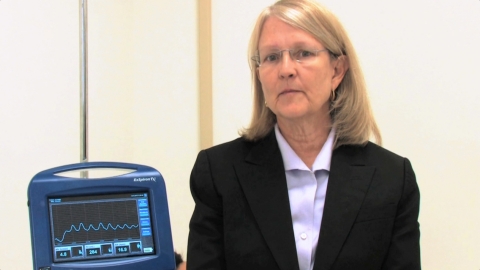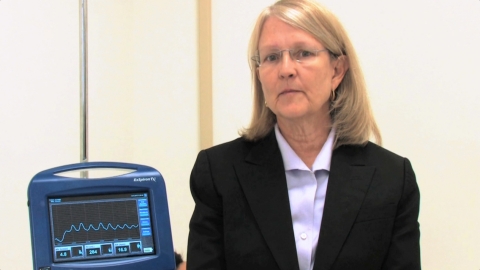WALTHAM, Mass.--(BUSINESS WIRE)--Respiratory Motion, Inc. today publicly announced findings of a landmark study featured in the current issue of Anesthesiology News indicating the potential of enhanced post-operative respiratory monitoring to significantly improve patient safety. The study’s lead author has been awarded the prestigious first prize at the Post Graduate Assembly in Anesthesiology in New York for study results, which demonstrate that post-operative respiratory volume monitoring can help predict the risk of life-threatening complications in post-surgical patients. The company also separately announced today the first $6 million close of an $8 million B Series venture funding round.
Respiratory depression (RD) is a life-threatening condition that typically manifests hours after a patient is considered stabilized and has left the recovery room. Urgent resuscitation is essential to prevent respiratory arrest, cardiac arrest, brain injury and death.
The study used Respiratory Motion’s innovative ExSpirontm respiratory volume monitoring system to identify patients for whom the risk of RD is sharply increased by the administration of post-operative opioids, a common pain management strategy. Despite concerted efforts, RD continues to be a key factor compromising patient safety. Opioid-induced respiratory depression (OIRD) currently results in more than 50,000 US deaths each year.
“RD claims more lives in the US each year than car accidents and gun violence combined,” notes Harvard study author and award recipient Christopher Voscopoulos, MD. “In large part, this is because the difference between shallow and effective breathing isn’t generally quantifiable in post-surgical settings. By the time heart and oxygen sensors alert staff to a problem, it has likely been building for hours and the patient may be in imminent risk of rapid decline.”
RD and post-operative respiratory failure are considered to be among the most common and expensive of pulmonary complications. Pulmonary complications are responsible for estimated costs in excess of $12 billion in the US.
The study monitored patients at a major Boston hospital undergoing elective orthopedic surgeries. Key respiratory status data was gathered when patients were once again breathing on their own after surgery, before post-procedural opioids were administered for pain management. Specifically, continuous Minute Ventilation (MV), Tidal Volume and Respiratory Rate data were collected non-invasively. MV is the fundamental unit of breathing, i.e. the amount of air that goes in and out of the lungs in a minute. MV is both controlled and carefully monitored in ventilated patients, but until the development of the ExSpiron system has not been able to be monitored after a mechanical ventilator is removed.
Fully 97% of patients whose post-procedural MV was determined to be within the safe zone subsequently remained stable following the administration of opioids for pain management. Moreover, almost three-quarters (72%) of patients whose post-procedural MV rates were in an unsafe zone later experienced a major drop in MV to below 40% under the same pain management strategies.
Study findings indicate that ExSpiron-based respiratory volume monitoring can fill a critical information gap with the capability to stratify post-operative patients based on their respiratory status. This new information can help clinicians individualize pain management therapies and opioid dosing.
Surprisingly, findings do not reveal a correlation between sleep apnea and OIRD; patients with and without sleep apnea both exhibited highly variable responses to opioids.
Participating anesthesiologists anticipate that study findings will help evolve current standards of care for both post-anesthesia care units (PACUs) and general medical floors, with non-invasive respiratory volume monitoring having as significant a potential impact on patient outcomes as did the introduction of cardiac telemetry.
Jenny Freeman, MD, cardiothoracic surgeon and Respiratory Motion CEO, concludes: “More of my cardiac surgical patients succumbed to post-operative respiratory problems than cardiac complications. By better predicting the likelihood of RD, we hope to help prevent a life-threatening chain of events. By monitoring in the PACU we can identify patients that have subtle, early signs of respiratory insufficiency or opioid sensitivity. By modifying our treatment of these patients with lower dose opioid protocols or alternate pain management strategies, we hope to reduce the incidence of episodes of RD that manifest unpredictably hours later on hospital floors everywhere. We’re encouraged by today’s findings and the growing awareness that respiratory volume monitoring will become as integral to quality healthcare as cardiac monitoring.”
About Respiratory Motion
Respiratory Motion, Inc. is a privately held medical device company based in Waltham, Massachusetts focused on the development and commercialization of innovative devices to monitor respiration. Its solutions leverage advances in digital processing and algorithmic programming. Its mission is to create respiratory technologies and products that help clinicians and hospitals improve patient safety and outcomes.




